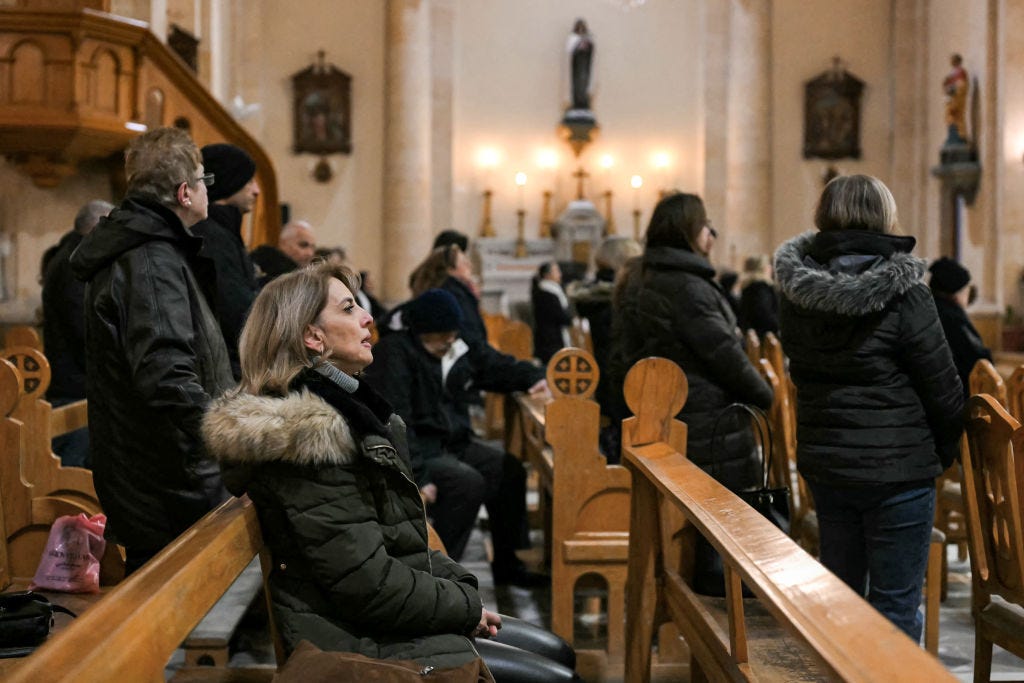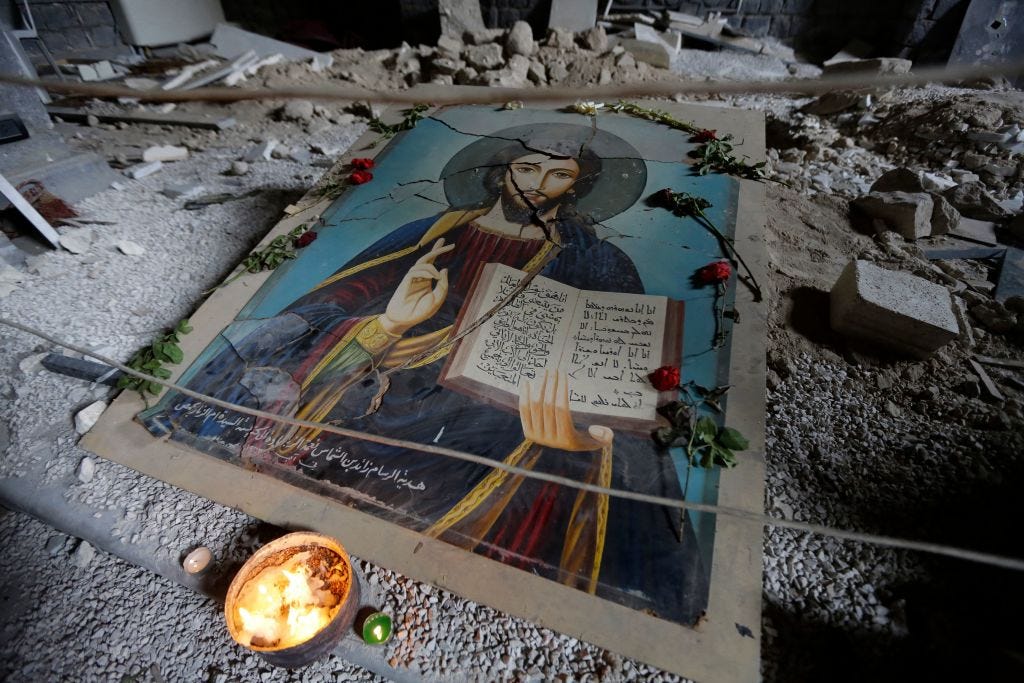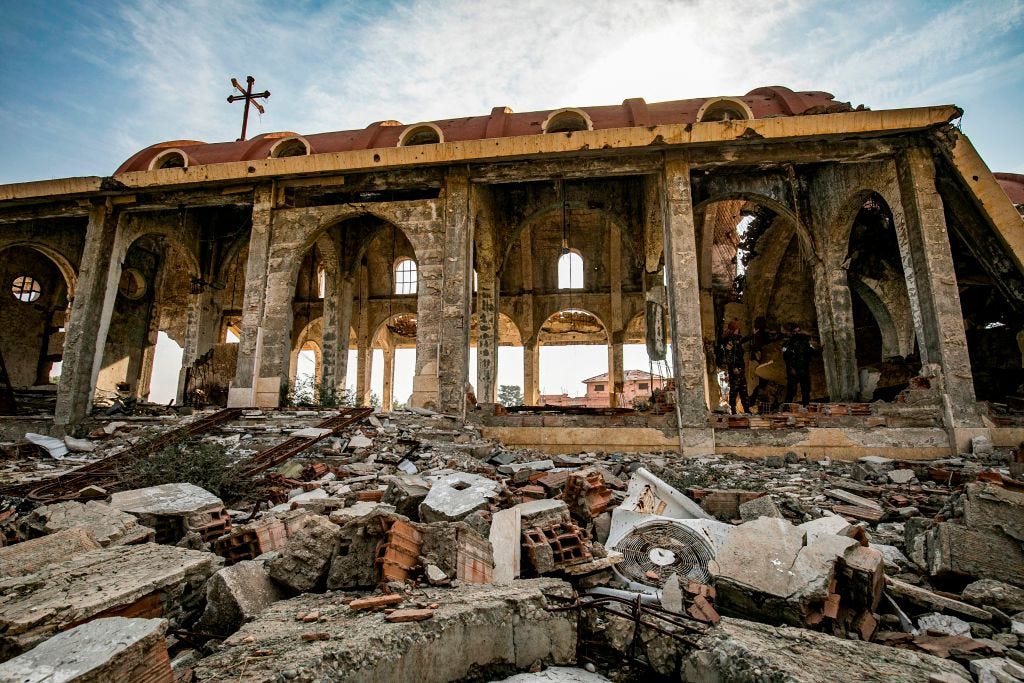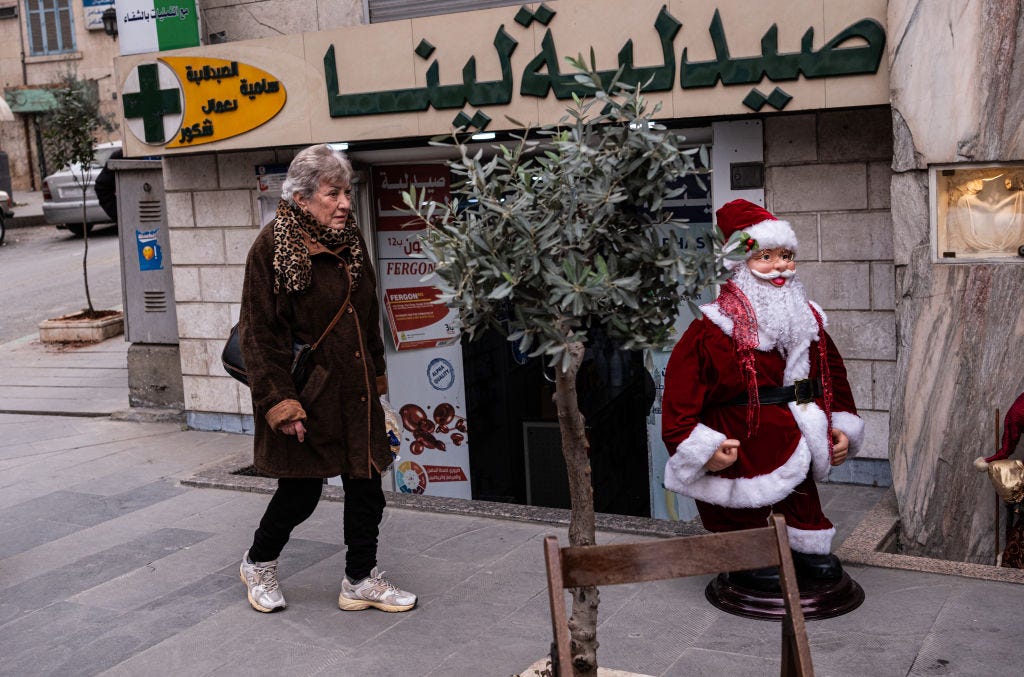- Joined
- Mar 11, 2013
- Messages
- 13,225
- Points
- 113
n the middle of the night on Monday, Elias, a 21-year-old Syrian Christian living in Berlin, received a voice message from his mother in Damascus. She was weeping. “If anything happens to us, do not come back to Syria,” she said. “Do not come to bury us. Do not come for this shitty piece of land, for this shitty house. Stay where you are.”
A Syrian rebel coalition led by Abu Mohammad al-Jolani had taken over the capital city on Sunday. And while Syrians are collectively celebrating the fall of Bashar al-Assad’s sadistic regime, Syrian Christians are nervous about their future in the region. The Islamist rebels in Syria have a history of persecuting Syrian Christians.
Elias, who asked that we use a pseudonym to protect his family, told The Free Press that he has seen some truly horrific acts by the rebels. In 2014, when he was still a child, he went to a family friend’s house to console them after their son was kidnapped by Islamist rebels from a Christian area. While they were there, their son’s severed head was delivered in a box—his cross necklace stuffed in his mouth. They buried his head in his family’s plot in a Christian graveyard. In 2022, at a church inauguration ceremony that some of Elias’s relatives attended, a rebel drone landed in the middle of the ceremony, killing two people and injuring 12.
“I’m only 21 years old,” Elias said. “But I’ve already buried 12 friends.” Not surprisingly, he fears the worst. “We have no reason to trust al-Jolani,” he said. “He is a terrorist.”
Al-Jolani is a former al-Qaeda member who was affiliated with one of the Mideast’s most savage terrorist groups, ISIS. In 2011, at the start of the Syrian Civil War, he formed an al-Qaeda offshoot called the Nusra Front to battle Assad’s soldiers.
Al-Jolani’s Nusra Front cut ties with al-Qaeda in 2016 and merged with other anti-Assad rebel groups in the area to form Hayat Tahrir al-Sham, which translates to “Organization for the Liberation of the Levant.” This is the group, led by al-Jolani, that rapidly took control over Syria in just 12 days, after 13 years of fighting Assad’s army.

Worshippers attend mass at the Roman Catholic Church of St. Francis of Assisi in Aleppo, Syria, on December 12, 2024. (Ozan Kose via Getty Images)
Two months ago, Mary, who also asked to use a pseudonym out of fear for her family’s safety, visited close relatives living in the area in western Syria called Valley of the Christians. When she was there, the Assad regime still controlled the territory, and mostly left the Christians alone. In an email to The Free Press, she wrote that the Islamist forces had since taken over her family’s small village as they were making their way to Damascus. It happened so quickly that Christians in the area “didn’t realize what was going on.”
For years, the attitude of the Syrian Christians was that if they left Assad alone, he’d leave them alone. And for the most part, that’s what happened. But the radical theology of many Islamist rebels in Syria resulted in acts of violence against Syrian Christians, everything from desecrating churches to kidnapping and murder.
So, when armed Islamist fighters standing in the streets of Mary’s village tell the Christians no harm will come to them, they have no reason to believe them.
For years, the Christians in Mary’s village held sizable Christmas celebrations. But this year, she said, “When the local Christmas tree was lit, just a handful of people showed up. Some shops are open, but many people don’t leave their houses and are waiting for what will happen next. Others, though, just want to go about their daily lives.”
The Free Press spoke to a Lebanese Christian who runs a ministry for young Syrian Muslim and Christian refugees in Beirut, many of whom have grown up in Lebanon due to the war. (He also requested anonymity.)
“The majority of young Muslims we work with are hoping to go back to Syria. They’re saying, ‘Now we can go visit our home country without any problems.’ Before, they were afraid to do that, because they were afraid they would be forced to join Assad’s army, or they would go to prison and be tortured, especially if they had family members who were part of a rebel group. So they feel joy and they are celebrating.”
But the Syrian Christian refugees, he added, are less hopeful. “They wonder if Syria will turn into a strict Islamic country under al-Jolani.”

A picture taken on May 12, 2014 shows a damaged painting of Jesus Christ on the ground of Syriac Orthodox Um al-Zenar church in Homs, Syria. (Joseph Eid via Getty Images)
To Western media, al-Jolani portrays himself as someone who has gone through a “rebrand.” He recently sat down with CNN’s Jomana Karadsheh, who covered her hair with a hijab for the interview. Behind al-Jolani, the black-on-white flag bearing the Islamic Shahada, which has also been flown by the Taliban and other jihadist groups, stood next to the red, black, and green flag of the Syrian opposition. During the interview, Al-Jolani told Karadsheh that his only goal was to overthrow Assad’s regime. He also said that minority religious groups will live peacefully under his Islamic government. “No one has the right to erase another group. These sects have coexisted in this region for hundreds of years, and no one has the right to eliminate them,” al-Jolani said, after acknowledging that some religious minorities were violated by rebels in the past. He said that Hayat Tahrir al-Sham has “addressed these issues.”
Al-Jolani shrugged off Hayat Tahrir al-Sham’s designation as a terrorist group, calling it “primarily political” and “inaccurate.” Meanwhile, the U.S. government still has a $10 million bounty on al-Jolani’s head for information on his whereabouts.
A 2023 report from the State Department detailed that in Hayat Tahrir al-Sham’s area of influence in northern Syria’s Idlib province, the group would frequently “unlawfully detain activists, journalists, and private citizens who were critical, including on social media, of their rule or religious doctrine.”
Although al-Jolani is saying all the right things to the Western media, Mary worries about what will happen when the world isn’t watching anymore.
“I will continue to pray,” she wrote in her email.
Christians have lived in Syria for over 2,000 years, but their numbers have dwindled since the beginning of the civil war in 2011, declining from 2.2 million to about 500,000 or less, making up just over 2 percent of the population. Richard Ghazal, a Syriac Orthodox Christian and executive director of In Defense of Christians, part of the Institute on Religion and Democracy in Washington, D.C., said that under Assad’s rule, Christians in Syria were generally protected by Assad as long as they didn’t raise objections to his cruel dictatorship. But they were always treated as second-class citizens. Many of them fled to Lebanon during the war. He said that Syrian Christian church leaders spoke favorably about Assad because they had to—it helped keep the Christian community safe.
“Bishops and priests in Syria and even in the United States knew that all their words and actions were scrutinized by the Assad government,” Ghazal told The Free Press. “If you weren’t a cheerleader for Assad, you were the opposition.”

A 2019 view of the Assyrian Church of the Virgin Mary, which was destroyed in 2015 by Islamic State fighters in Tal Tamr, Syria. (Delil Souleman via Getty Images)
This week, Fr. Bahjat Karakach, a Franciscan friar in Aleppo, told Vatican News that Christians living under Assad were not living, but were merely surviving.
Ghazal met with the State Department and politicians on Capitol Hill earlier this week and urged them to make it clear to Al-Jolani that America is watching. “The United States needs to show that we are interested. They need to show that we’re not going to be fooled, and we’re going to use whatever means possible from a foreign-policy standpoint to make sure this is right.”
Ghazal said he has received reports from Syria of rebels destroying liquor stores, since alcohol is banned in Islam, and of rebels telling women to cover their hair.
“This is chapter one,” said Ghazal. “Hayat Tahrir al-Sham is still trying to woo the world.”
Nina Shea, director of the Hudson Institute’s Center for Religious Freedom, told The Free Press that Christians in Syria are vulnerable because “they have no protector, no militia, and people take advantage of them, either for criminal reasons or for ideological reasons, so they’re very much in peril. Whether it’s an Islamist authoritarian rule or whether it’s just political chaos, they’re fearful.”
And yet, in Aleppo, Syria’s second-largest city and the first to fall to Hayat Tahrir al-Sham, there is a strange normalcy. “Things are positive for the Christian community,” said Hadeel Oueis, a Syrian Christian living in the U.S. who grew up in Aleppo. “The Islamist rebel groups want to show the international community that they have changed. They want the West to take them off the list of terrorist organizations. So they are behaving.” Oueis was arrested in 2011 and imprisoned for posting information on Facebook about anti-Assad protests in Aleppo. Despite the rebel takeover, she said, the members of her family have been able to return to work.

A Santa Claus statue is displayed as the Christian community begins Christmas preparations in Aleppo, Syria, on December 5, 2024. (Emin Sansar via Getty Images)
The Center for Peace Communications, where Oueis works, conducted on-the-street interviews with Christians in Aleppo after Al-Jolani’s takeover, and most were cautiously optimistic. “The first two or three days were uncomfortable, and we were very afraid,” said one woman. “We’ve had enough of war. It’s been 13 years, and our children haven’t been able to experience life. But after a couple of days, the electricity got better, and our situation has become better, safer.”
It’s too early to tell if al-Jolani will keep his word and ensure the safety of minority religious groups under his rule. Previous examples of Islamists taking control of a country aren’t encouraging. In 2020, after the U.S. withdrew from Afghanistan, the Taliban, a Sunni Islamist terrorist organization much like Hayat Tahrir al-Sham, promised to allow girls and women to attend school and universities. Nearly four years later, girls are banned from attending school beyond sixth grade, and women are no longer allowed to speak in public.
On Wednesday in Damascus, the electricity was out. Even though Elias’s family home has solar panels, they didn’t turn on the lights. People with access to solar energy are assumed to be wealthy, and his parents didn’t want to attract the attention of possible looters and robbers. For now, there is nothing to do but wait in the dark.
A Syrian rebel coalition led by Abu Mohammad al-Jolani had taken over the capital city on Sunday. And while Syrians are collectively celebrating the fall of Bashar al-Assad’s sadistic regime, Syrian Christians are nervous about their future in the region. The Islamist rebels in Syria have a history of persecuting Syrian Christians.
Elias, who asked that we use a pseudonym to protect his family, told The Free Press that he has seen some truly horrific acts by the rebels. In 2014, when he was still a child, he went to a family friend’s house to console them after their son was kidnapped by Islamist rebels from a Christian area. While they were there, their son’s severed head was delivered in a box—his cross necklace stuffed in his mouth. They buried his head in his family’s plot in a Christian graveyard. In 2022, at a church inauguration ceremony that some of Elias’s relatives attended, a rebel drone landed in the middle of the ceremony, killing two people and injuring 12.
“I’m only 21 years old,” Elias said. “But I’ve already buried 12 friends.” Not surprisingly, he fears the worst. “We have no reason to trust al-Jolani,” he said. “He is a terrorist.”
Al-Jolani is a former al-Qaeda member who was affiliated with one of the Mideast’s most savage terrorist groups, ISIS. In 2011, at the start of the Syrian Civil War, he formed an al-Qaeda offshoot called the Nusra Front to battle Assad’s soldiers.
Al-Jolani’s Nusra Front cut ties with al-Qaeda in 2016 and merged with other anti-Assad rebel groups in the area to form Hayat Tahrir al-Sham, which translates to “Organization for the Liberation of the Levant.” This is the group, led by al-Jolani, that rapidly took control over Syria in just 12 days, after 13 years of fighting Assad’s army.

Worshippers attend mass at the Roman Catholic Church of St. Francis of Assisi in Aleppo, Syria, on December 12, 2024. (Ozan Kose via Getty Images)
Two months ago, Mary, who also asked to use a pseudonym out of fear for her family’s safety, visited close relatives living in the area in western Syria called Valley of the Christians. When she was there, the Assad regime still controlled the territory, and mostly left the Christians alone. In an email to The Free Press, she wrote that the Islamist forces had since taken over her family’s small village as they were making their way to Damascus. It happened so quickly that Christians in the area “didn’t realize what was going on.”
For years, the attitude of the Syrian Christians was that if they left Assad alone, he’d leave them alone. And for the most part, that’s what happened. But the radical theology of many Islamist rebels in Syria resulted in acts of violence against Syrian Christians, everything from desecrating churches to kidnapping and murder.
So, when armed Islamist fighters standing in the streets of Mary’s village tell the Christians no harm will come to them, they have no reason to believe them.
For years, the Christians in Mary’s village held sizable Christmas celebrations. But this year, she said, “When the local Christmas tree was lit, just a handful of people showed up. Some shops are open, but many people don’t leave their houses and are waiting for what will happen next. Others, though, just want to go about their daily lives.”
The Free Press spoke to a Lebanese Christian who runs a ministry for young Syrian Muslim and Christian refugees in Beirut, many of whom have grown up in Lebanon due to the war. (He also requested anonymity.)
“The majority of young Muslims we work with are hoping to go back to Syria. They’re saying, ‘Now we can go visit our home country without any problems.’ Before, they were afraid to do that, because they were afraid they would be forced to join Assad’s army, or they would go to prison and be tortured, especially if they had family members who were part of a rebel group. So they feel joy and they are celebrating.”
But the Syrian Christian refugees, he added, are less hopeful. “They wonder if Syria will turn into a strict Islamic country under al-Jolani.”

A picture taken on May 12, 2014 shows a damaged painting of Jesus Christ on the ground of Syriac Orthodox Um al-Zenar church in Homs, Syria. (Joseph Eid via Getty Images)
To Western media, al-Jolani portrays himself as someone who has gone through a “rebrand.” He recently sat down with CNN’s Jomana Karadsheh, who covered her hair with a hijab for the interview. Behind al-Jolani, the black-on-white flag bearing the Islamic Shahada, which has also been flown by the Taliban and other jihadist groups, stood next to the red, black, and green flag of the Syrian opposition. During the interview, Al-Jolani told Karadsheh that his only goal was to overthrow Assad’s regime. He also said that minority religious groups will live peacefully under his Islamic government. “No one has the right to erase another group. These sects have coexisted in this region for hundreds of years, and no one has the right to eliminate them,” al-Jolani said, after acknowledging that some religious minorities were violated by rebels in the past. He said that Hayat Tahrir al-Sham has “addressed these issues.”
Al-Jolani shrugged off Hayat Tahrir al-Sham’s designation as a terrorist group, calling it “primarily political” and “inaccurate.” Meanwhile, the U.S. government still has a $10 million bounty on al-Jolani’s head for information on his whereabouts.
A 2023 report from the State Department detailed that in Hayat Tahrir al-Sham’s area of influence in northern Syria’s Idlib province, the group would frequently “unlawfully detain activists, journalists, and private citizens who were critical, including on social media, of their rule or religious doctrine.”
Although al-Jolani is saying all the right things to the Western media, Mary worries about what will happen when the world isn’t watching anymore.
“I will continue to pray,” she wrote in her email.
Christians have lived in Syria for over 2,000 years, but their numbers have dwindled since the beginning of the civil war in 2011, declining from 2.2 million to about 500,000 or less, making up just over 2 percent of the population. Richard Ghazal, a Syriac Orthodox Christian and executive director of In Defense of Christians, part of the Institute on Religion and Democracy in Washington, D.C., said that under Assad’s rule, Christians in Syria were generally protected by Assad as long as they didn’t raise objections to his cruel dictatorship. But they were always treated as second-class citizens. Many of them fled to Lebanon during the war. He said that Syrian Christian church leaders spoke favorably about Assad because they had to—it helped keep the Christian community safe.
“Bishops and priests in Syria and even in the United States knew that all their words and actions were scrutinized by the Assad government,” Ghazal told The Free Press. “If you weren’t a cheerleader for Assad, you were the opposition.”

A 2019 view of the Assyrian Church of the Virgin Mary, which was destroyed in 2015 by Islamic State fighters in Tal Tamr, Syria. (Delil Souleman via Getty Images)
This week, Fr. Bahjat Karakach, a Franciscan friar in Aleppo, told Vatican News that Christians living under Assad were not living, but were merely surviving.
Ghazal met with the State Department and politicians on Capitol Hill earlier this week and urged them to make it clear to Al-Jolani that America is watching. “The United States needs to show that we are interested. They need to show that we’re not going to be fooled, and we’re going to use whatever means possible from a foreign-policy standpoint to make sure this is right.”
Ghazal said he has received reports from Syria of rebels destroying liquor stores, since alcohol is banned in Islam, and of rebels telling women to cover their hair.
“This is chapter one,” said Ghazal. “Hayat Tahrir al-Sham is still trying to woo the world.”
Nina Shea, director of the Hudson Institute’s Center for Religious Freedom, told The Free Press that Christians in Syria are vulnerable because “they have no protector, no militia, and people take advantage of them, either for criminal reasons or for ideological reasons, so they’re very much in peril. Whether it’s an Islamist authoritarian rule or whether it’s just political chaos, they’re fearful.”
And yet, in Aleppo, Syria’s second-largest city and the first to fall to Hayat Tahrir al-Sham, there is a strange normalcy. “Things are positive for the Christian community,” said Hadeel Oueis, a Syrian Christian living in the U.S. who grew up in Aleppo. “The Islamist rebel groups want to show the international community that they have changed. They want the West to take them off the list of terrorist organizations. So they are behaving.” Oueis was arrested in 2011 and imprisoned for posting information on Facebook about anti-Assad protests in Aleppo. Despite the rebel takeover, she said, the members of her family have been able to return to work.

A Santa Claus statue is displayed as the Christian community begins Christmas preparations in Aleppo, Syria, on December 5, 2024. (Emin Sansar via Getty Images)
The Center for Peace Communications, where Oueis works, conducted on-the-street interviews with Christians in Aleppo after Al-Jolani’s takeover, and most were cautiously optimistic. “The first two or three days were uncomfortable, and we were very afraid,” said one woman. “We’ve had enough of war. It’s been 13 years, and our children haven’t been able to experience life. But after a couple of days, the electricity got better, and our situation has become better, safer.”
It’s too early to tell if al-Jolani will keep his word and ensure the safety of minority religious groups under his rule. Previous examples of Islamists taking control of a country aren’t encouraging. In 2020, after the U.S. withdrew from Afghanistan, the Taliban, a Sunni Islamist terrorist organization much like Hayat Tahrir al-Sham, promised to allow girls and women to attend school and universities. Nearly four years later, girls are banned from attending school beyond sixth grade, and women are no longer allowed to speak in public.
On Wednesday in Damascus, the electricity was out. Even though Elias’s family home has solar panels, they didn’t turn on the lights. People with access to solar energy are assumed to be wealthy, and his parents didn’t want to attract the attention of possible looters and robbers. For now, there is nothing to do but wait in the dark.
